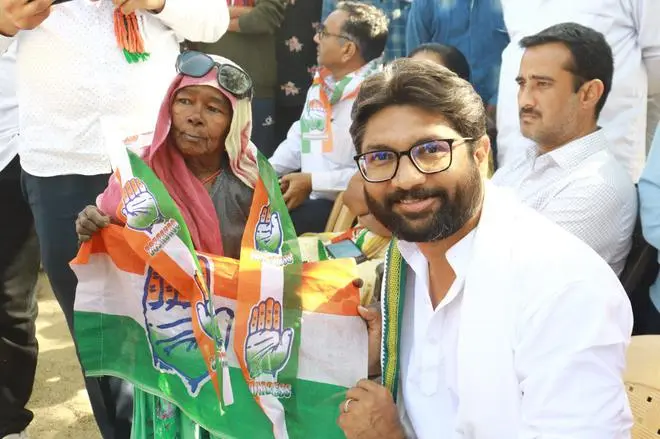Ahmedabad, November 22 The political trajectory of three young leaders in Gujarat is reflective of how the BJP turned the tide of popular opinion which had shown signs of a drift in the last Assembly elections in 2017.

The charismatic Hardik Patel and astute Alpesh Thakor who caused immense consternation in the BJP camp in 2017 are now a pale shadow of their former firebrand selves after having been subsumed by the BJP. The scholarly Dalit activist Jignesh Mevani, on the other hand, has grown in stature and is now the acting president of the Congress. All three are contesting the ongoing Assembly elections, Hardik and Alpesh on the BJP ticket and Jignesh as a Congress candidate.
File Photo of Alpesh Thakor | Photo Credit: VIJAY SONEJI
Taming the Kshatriya
Sample the desperation with which Alpesh Thakor tried to shed his “outsider” tag and ratcheted up the BJP rhetoric even when he was filing his own nomination for the Gandhinagar (South) assembly constituency. “Make the Lotus victorious, like you have always done,” he said.
This is a far cry from the aggressive agitator in 2016 who ran a movement against liquor addiction in his community and formed the OBC, SC-ST (OSS) Ekta Manch in 2016. Targeting the ruling BJP government for its “ineffective” liquor ban policy, Thakor had put the Vijay Rupani administration on a month’s notice to stop illegal liquor dens in the State, or face “Janta raids”.
Thakor joined Congress in October 2017 ahead of the Assembly polls of 2017 and fought the election from Radhanpur seat in Patan district, earlier represented by BJP’s Nagarji Thakor. He secured 85,777 votes and defeated Lavingji Thakor of the BJP with a margin of 14,857 votes.
But within two years, he turned against the Congress, cross-voting in the Rajya Sabha polls in favour of BJP candidate S Jaishankar. He joined the BJP in July 2019 and was subsequently fielded by the party in the bypolls from Radhanpur constituency.
Alpesh lost to Congress’ Raghu Desai by 3,814 votes.
He now has to depend on the BJP to give him a “safe” seat in Gandhinagar (South) in return for surrendering all past aggression in favour of an all-out campaign for his new party.
Patidar mascot is a shadow
Riding on the Patidar reservation agitation, Hardik Patel had become a force to reckon with in Gujarat. But mobilising about 5 lakh people on Ahmedabad streets in August 2015 led to a violence that claimed 14 lives and landed Hardik into sedition charges and a host of criminal cases against him. While the BJP strained to contain damage, the Anandiben Patel government announced 10 per cent reservation for economically backward class (EBC) from non-reserved communities including Patidars, Brahmins, Baniya among others in May 2016.
Simultaneously, Hardik was pushed him into exile out of Gujarat for about six months because of several court cases. Conviction in one of the rioting cases also prevented him from contesting elections.
He tried to seek political support, joining the Congress in 2019 but could not contest the Lok Sabha polls due to his conviction. In June 2022, a month after Supreme Court granted a stay on his conviction, Hardik switched sides and joined BJP. The party has fielded him from his native Viramgam constituency, which has less than 20 per cent urban voters and was earlier held by Congress in 2012 and 2017 polls.
But he is hardly the mass-mobiliser he once was, having been reduced to an ordinary BJP worker without much fan-following at the party’s State headquarters. “He comes and goes sometimes even unnoticed. He’s just like any other candidate for us,” said a BJP worker.
The survivor

Jignesh Mevani
Jignesh Mevani is the only one among the three Young Turks of 2017 who has not just held his own but progressed – from an independent MLA in 2017 to the working president of the Gujarat Pradesh Congress Committee.
Although he is facing a challenge on the ground in his constituency, Vadgam, from Manibhai Vaghela, a former Congress MLA from the same constituency with a strong ground connect who has switched sides to the BJP and was awarded with a party ticket, Jignesh has an activist’s vision. “I am an activist. Winning elections is not a life-and-death issue for me,” Jignesh told businessline. “I am looking forward to political work in the future,” he said, explaining how he has grown politically over the years.
“We experienced a lot in 2017. But we were not very well organised. We were not aware of the grammar of electoral politics and dimensions and how things operate,” he said. He is now emerging as a voice for Dalit issues and against atrocities and injustice.



Comments
Comments have to be in English, and in full sentences. They cannot be abusive or personal. Please abide by our community guidelines for posting your comments.
We have migrated to a new commenting platform. If you are already a registered user of TheHindu Businessline and logged in, you may continue to engage with our articles. If you do not have an account please register and login to post comments. Users can access their older comments by logging into their accounts on Vuukle.